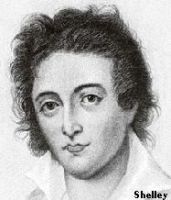
Percy Bysshe Shelley (August 4, 1792 – July 8, 1822)
Among the major English Romantic poets, Shelley is considered one of the finest lyric poets of the English language. He was married to the famous novelist Mary Shelley, author of Frankenstein.
On July 8, 1822, less than a month before his 30th birthday, Shelley drowned in a sudden storm off the coast of Italy. Shelley's body washed ashore and was cremated on the beach near Viareggio. He was later buried in Rome.
Some of my Shelley favorites:
Asia: From Prometheus Unbound
My soul is an enchanted boat,
Which, like a sleeping swan, doth float
Upon the silver waves of thy sweet singing;
And thine doth like an angel sit
Beside a helm conducting it,
Whilst all the winds with melody are ringing.
It seems to float ever, for ever,
Upon that many-winding river,
Between mountains, woods, abysses,
A paradise of wildernesses!
Till, like one in slumber bound,
Borne to the ocean, I float down, around,
Into a sea profound, of ever-spreading sound:
Meanwhile thy spirit lifts its pinions
In music's most serene dominions;
Catching the winds that fan that happy heaven.
And we sail on, away, afar,
Without a course, without a star,
But, by the instinct of sweet music driven;
Till through Elysian garden islets
By thee, most beautiful of pilots,
Where never mortal pinnace glided,
The boat of my desire is guided:
Realms where the air we breathe is love,
Which in the winds and on the waves doth move,
Harmonizing this earth with what we feel above.
We have past Age's icy caves,
And Manhood's dark and tossing waves,
And Youth's smooth ocean, smiling to betray:
Beyond the glassy gulfs we flee
Of shadow-peopled Infancy,
Through Death and Birth, to a diviner day;
A paradise of vaulted bowers,
Lit by downward-gazing flowers,
And watery paths that wind between
Wildernesses calm and green,
Peopled by shapes too bright to see,
And rest, having beheld; somewhat like thee;
Which walk upon the sea, and chant melodiously!
Love's Philosophy
The fountains mingle with the river
And the rivers with the ocean,
The winds of Heaven mix for ever
With a sweet emotion;
Nothing in the world is single,
All things by a law divine
In one spirit meet and mingle -
Why not I with thine?
See the mountains kiss high Heaven
And the waves clasp one another;
No sister-flower would be forgiven
If it disdained its brother;
And the sunlight clasps the earth,
And the moonbeams kiss the sea -
What are all these kissings worth
If thou kiss not me?
*note: I have always loved the mystery of the following
Ozymandias
I met a traveller from an antique land
Who said: "Two vast and trunkless legs of stone
Stand in the desert . . . Near them, on the sand,
Half sunk, a shattered visage lies, whose frown,
And wrinkled lip, and sneer of cold command,
Tell that its sculptor well those passions read
Which yet survive, stamped on these lifeless things,
The hand that mocked them, and the heart that fed:
And on the pedestal these words appear:
'My name is Ozymandias, king of kings:
Look on my works, ye Mighty, and despair!'
Nothing beside remains. Round the decay
Of that colossal wreck, boundless and bare
The lone and level sands stretch far away."
To Night
Swiftly walk over the western wave,
Spirit of Night!
Out of the misty eastern cave
Where, all the long and lone daylight,
Thou wovest dreams of joy and fear,
Which make thee terrible and dear, --
Swift be thy flight!
Wrap thy form in a mantle grey,
Star-inwrought!
Blind with thine hair the eyes of Day,
Kiss her until she be wearied out,
Then wander o'er city, and sea, and land,
Touching all with thine opiate wand --
Come, long-sought!
When I arose and saw the dawn,
I sighed for thee;
When light rode high, and the dew was gone,
And noon lay heavy on flower and tree,
And the weary Day turned to his rest,
Lingering like an unloved guest,
I sighed for thee.
Thy brother Death came, and cried
`Wouldst thou me?'
Thy sweet child Sleep, the filmy-eyed,
Murmured like a noontide bee
`Shall I nestle near thy side?
Wouldst thou me?' -- And I replied
`No, not thee!'
Death will come when thou art dead,
Soon, too soon --
Sleep will come when thou art fled;
Of neither would I ask the boon
I ask of thee, beloved Night --
Swift be thine approaching flight,
Come soon, soon!
--Percy Bysshe Shelley
